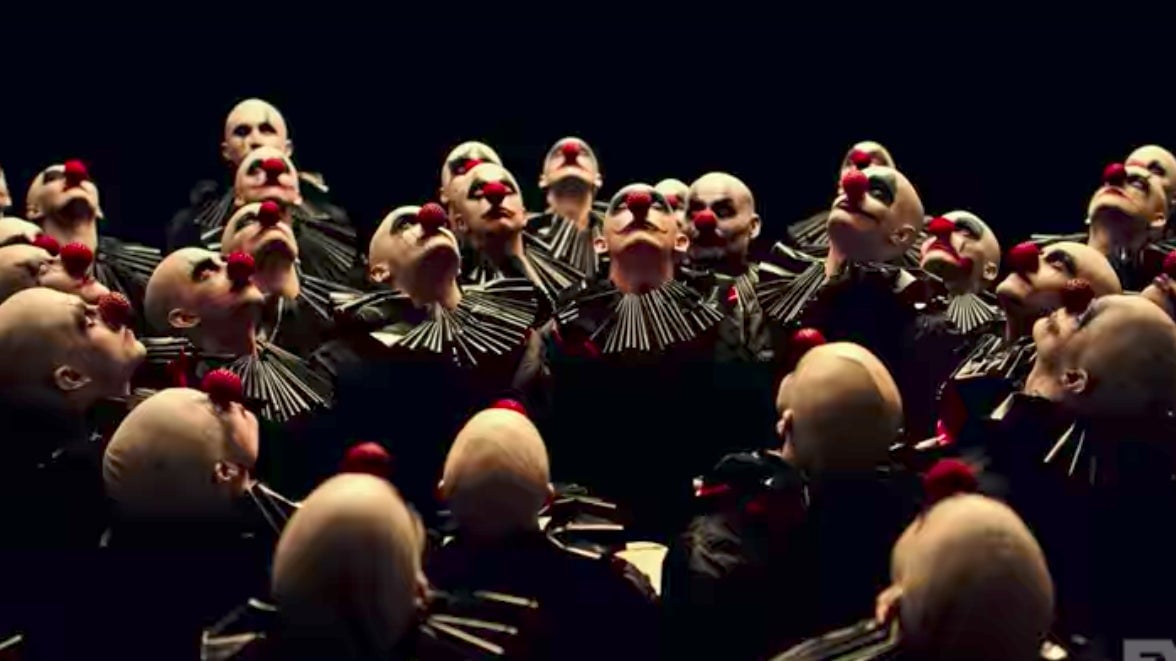Why is TV so obsessed with cults right now?
Like the difficult man or the damaged anti-hero, the “charismatic cult leader” is quickly becoming one of American television’s most popular archetypes.


Like the difficult man or the damaged anti-hero, the “charismatic cult leader” is quickly becoming one of American television’s most popular archetypes.
The trope will next manifest in Waco, a six-part miniseries dramatizing the true story of the Branch Davidians cult, its lead “prophet” David Koresh, and their deaths during a 51-day siege on the sect’s Texas compound by US government agents. The cast is as good as any other prestige drama: Koresh will be played by Taylor Kitsch, best known as the brooding, troubled young football hero Tim Riggins in Friday Night Lights. Andrea Riseborough, Michael Shannon, and John Leguizamo will also star.
Waco, which premieres in January on the Paramount Network, joins a growing list of TV shows (as well as films and books) that explore America’s fascination with cults. It seems that every month there’s a new series on TV about a persuasive creep (who’s almost always a man) and his band of unyielding acolytes.
In 2013, we got The Following, which, as its title suggests, followed a deranged serial killer’s cult following and one former FBI agent’s (Kevin Bacon) attempt to stop them. That same year, HBO’s True Detective debuted; its first season tracked a murderous satanic cult through the swamps of Louisiana.
A year later, two more major American TV series about cults premiered: Aquarius, about the real-life Manson family, and The Path, about a fictional cult religion called “Meyerism.”
But wait, there’s more! Actor Jake Gyllenhaal is producing an anthology series about cults for A&E. Breaking Bad creator Vince Gilligan is writing a limited series for HBO about cult leader Jim Jones and the 1978 massacre that resulted in the deaths of over 900 people in a remote settlement in Guyana.
So, what gives? Why are there so many cults on TV all of a sudden?
One obvious answer is, as horrific as these stories are (many of which are true), they make for captivating entertainment. As with our obsession with serial killers, cults and cult leaders are difficult for most people to understand, and therefore intriguing. The psychology of joining, and remaining in, a cult is a dense topic that for decades has been studied in academia but is now seeing a resurgence in our entertainment—at a time when no interesting part of our history or culture goes unexplored by executives desperate for provocative material.
But that’s just part of it, and you could make the same argument about the popularity of many other plot trends on TV and in film (cop shows, law shows, hospital shows—once TV finds a trope it likes, it sticks with it ad nauseam). What specifically about cults is making them such a huge part of American entertainment right this second?
American Horror Story holds a major clue. This season of the anthology horror series, which follows a completely different story each year, deals explicitly with a homicidal clown cult that springs up in the aftermath of the 2016 US presidential election. The season is subtitled, straightforwardly, “Cult.”

Beneath the usual scary-movie antics and its rote home invasion tropes, American Horror Story: Cult is an engaging meditation on fear. Specifically, the type of fear many of us feel in a bitterly divided global landscape, where people are separated into fanatical tribes and are being told to distrust anyone different from them. The prevalence of cults on TV simply reflects an America, and much of the world, that’s devolving further and further into tribalism.
It doesn’t help that several world leaders are themselves cults of personality, leading their own factions of devout followers. Cults are all around us. Shows such as The Following and American Horror Story just exaggerate the realities of political life in 2017, preying on our fears of where extreme division and isolation might someday lead us.
There’s one other thing, too: fake news. As skeptical as people in power have told their followers to be of peers, they’ve been taught to be even more suspicious of their institutions—a common thread among many of the most notorious cults. Koresh’s Branch Davidians, and the siege that led to their deaths, has inspired a cadre of right-wing, anti-government militia groups in the US that believe the reason Koresh and his followers were killed was because the government wanted to take their guns. (Koresh had stockpiled machine guns, which concerned US agents—with good reason, it turned out. But he had also been accused of child abuse and statutory rape at the time of the fatal raid on his compound.)
One of the central tenets of effective cult leadership is convincing followers to disbelieve any negative things someone else might say about the cult. Understanding how a person is able to turn madness into doctrine, and facts into falsehoods, is one of the most pressing political questions of our time—and it’s one that Hollywood is deep into investigating.